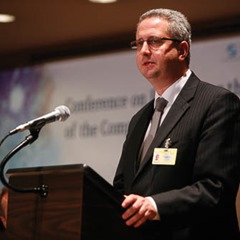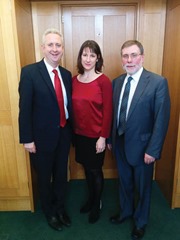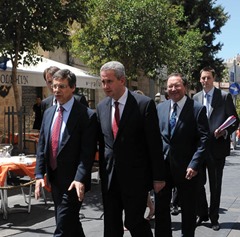A time for progress
 Local politicians need to strike an initial agreement on dealing with the past, Ivan Lewis tells Peter Cheney. The Shadow Secretary of State calls for more urgency and a debate about a new flag for Northern Ireland.
Local politicians need to strike an initial agreement on dealing with the past, Ivan Lewis tells Peter Cheney. The Shadow Secretary of State calls for more urgency and a debate about a new flag for Northern Ireland.
“I’d like you to go to the Department of Health and be the Minister for Social Care,” Ivan Lewis recalls Tony Blair saying when a reshuffle came round in 2006. “You do realise Tony, that’s what I did for my entire life before I came into Parliament,” he replied before sensing a pause at the end of the phone. “No, I didn’t realise that,” the Prime Minister added, which in Lewis’ view “sums up how these decisions are made.”
Lewis has been Shadow Secretary of State for Northern Ireland since last October. Caring for people with learning disabilities first sparked his interest in politics back in the 1980s. He started volunteering at the age of 14 and then left school at 17 to work in that area.
Shortly afterwards, he set up his own charity: Contact Community Care Group.
“At the same time, I got involved in the local Labour party. And I guess, when you are working in an environment working with vulnerable people, you see lots of injustices [and] unfairness,” he remarks. “It was during the height of the Thatcher era and that very much politicised me.”
He was elected to Bury Council in 1990 and to Parliament in 1997.
He made a brief visit to Northern Ireland when Peter Mandelson was Secretary of State.
“I’ve had a very fulfilling and interesting set of experiences,” he says of his ministerial career. He was firstly Parliamentary Private Secretary to Trade and Industry Secretary Stephen Byers. Between 2001 and 2005, he was a junior Minister in the Department for Education and Skills, mainly focusing on skills and vocational education.
Lewis was then Economic Secretary to the Treasury (2005-2006) before an enjoyable two years in the Department of Health. He’s pleased to have raised the profile of mental health and dementia, which are now widely discussed.
 At the Department for International Development (2008-2009), he worked on reducing deaths in childbirth in developing countries. After a year, Gordon Brown asked him to move to the Foreign and Commonwealth Office. The role – effectively deputy Foreign Secretary – covered the Middle East, the UK’s relations with the USA and China, counter-terrorism and nuclear proliferation.
At the Department for International Development (2008-2009), he worked on reducing deaths in childbirth in developing countries. After a year, Gordon Brown asked him to move to the Foreign and Commonwealth Office. The role – effectively deputy Foreign Secretary – covered the Middle East, the UK’s relations with the USA and China, counter-terrorism and nuclear proliferation.
Lewis counts the reform programme in social care and dementia policy, the campaign to reduce maternal deaths and the concept of apprenticeships for 14-16 year olds as his main achievements.
After Labour left office, it was a “great honour” to be elected to the Shadow Cabinet by his fellow MPs “because up until then it was about patronage really.”
He thought that his first opposition remit (culture, media and sport) would be “quite a quiet brief” but then found himself responding to the phone-hacking scandal. Lewis then went back to covering international development before succeeding Vernon Coaker in the Northern Ireland brief last year.
Legacy
Just a few days before the interview, Peter Hain told The Times that the on-the-runs deal would never have happened in Britain and cases in Northern Ireland should be treated differently. It is put to Lewis that this implies a different (and lower) ethical standard for the province.
Lewis responds: “I think it would be very unwise and disingenuous to unpick individual elements of a peace process that was incredibly complex, very, very challenging – and people worked very hard to bring 30 years of conflict to an end.”
He would not “recant” for the scheme but makes clear that he disagrees with Peter Hain’s call for an amnesty. “I’m philosophically and fundamentally opposed to the concept of amnesty and we now know that this on-the-runs scheme was not an amnesty,” he adds, pointing to statements by Theresa Villiers and the judiciary.
The families bereaved by the Hyde Park bombing were owed an apology for the “catastrophic error” that was made in the case. The PSNI has apologised but it “remains to be seen” whether it was responsible for that error.
Lewis notes that the Executive parties have considered a truth recovery route alongside cold case inquiries, which would involve limited immunity for suspects. This is not an amnesty as other evidence can be used to investigate and prosecute the suspect.
Northern Ireland’s politicians “need to be straight with people” about the distinction between amnesty and limited immunity: “It’s important we get these things right because otherwise people will say in the future: ‘You were dishonest.’”
An across-the-board amnesty “doesn’t deal with the wounds of the past” and could “exacerbate” them as well as failing to put victims at the centre. He prefers a range of choices from which victims can choose according to their circumstances e.g. truth, justice and reparation.
The failure to make progress on the Haass issues creates an impression that “politics doesn’t work”. Labour maintains that it is “crucially important that an agreement is signed as soon as possible.”
Lewis emphasises: “We are not saying, by the way, that every dot and comma, every sentence of Haass’ draft seven [the published document] should be implemented. We accept that there is a need for further negotiations.”
 For example, he foresees a 12-18 month process for agreeing on flags and symbols.
For example, he foresees a 12-18 month process for agreeing on flags and symbols.
“We can’t duck these issues forever,” Lewis continues. His own view is that poverty and a lack of jobs and education have contributed to the problem and loyalists expressed that sense of alienation through the flags protests.
Lewis adds that the phrase “parity of esteem” has been lost and adds: “We’re still a long way away from the different communities in Northern Ireland being ready to give that parity of esteem to other communities.”
Constitutionally, there are “entirely appropriate” occasions for flying the union flag but the “when and where” issues are more complex. As a means of reconciliation – and not replacing the union flag – he wants to see a debate about a new Northern Ireland-specific flag.
“I’m not saying I’m for it or against it,” Lewis remarks but “creative ways” have to be found to deal with the sensitivities involved. He also wants a process of negotiation about identity to cover unofficial flag-flying and how to enforce any agreement. Politicians talk about a shared future “but we’ve got to start putting the meat on the bones in terms of what that means.”
He declines to comment on parading, preferring to focus attention on the past and flags. Labour’s submission to the Haass talks proposed the publication of explanations alongside all Parades Commission decisions, a clear and speedy appeals process, and an expectation that all politicians support decisions once due process has been followed.
The underlying theme in all of his comments is that the media and the public need to read and understand exactly what was proposed in the Haass document rather than rely on speculation.
Local party
Separately, Lewis has helped to develop Labour’s One Nation brand. The party has had a membership in Northern Ireland since 2003 but does not contest elections in the province. Challenged on that apparent contradiction, Lewis says he is pleased that the party allows local people to join and praises members’ work e.g. campaigning for a living wage.
“We do not believe it would be in Northern Ireland’s interests to field Labour candidates at this time,” he states. “We’ve been very clear about that and that will not change for the foreseeable future.” Fielding candidates would involve competing with the SDLP – its sister party – and the Republic’s parties may feel “obliged” to run in the North as well. It would also be much harder for the UK Government to be an “honest broker” in the province.
“I personally think, if you look at the fragility of the peace process in Northern Ireland right now, that honest broker role has never been more important,” Lewis comments. “One of the things I’ve expressed serious concern about is the disengagement of the current Government from Northern Ireland.”
He adds: “Now, I’m not saying that this is forever. People talk about normalised politics in Northern Ireland and I understand why they do that – and I think we do need to move towards that over time – but I don’t see, as I say for the foreseeable future, the case for fielding Labour candidates has been made.”
It takes a lot, though, for local voters to trust a governing party which has no electoral mandate in the region. He accepts that point and finds that most people in Northern Ireland respect the leadership role that Labour has played during the peace process.
“That respect is very, very important in terms of my ability to do this job,” he adds. The peace process would not have happened without ordinary people saying “enough is enough,” courage shown by their leaders and also Labour’s determination to focus on the issue. He also acknowledges John Major’s work before Blair came to power.
The general election is now less than a year away. If returned to government next year, Labour would place a “paramount importance” on security – it has a bipartisan approach with the Government on this regardless of their differences on other issues.
“We are very concerned about the threat that is being posed, particularly by dissident republicans right now, and there can be no letting up on our focus on that,” he states, paying tribute to the police and security services’ work on thwarting many attacks.
Secondly, he returns to the point that too many communities feel that peace has not delivered a better quality of life for them. He pledges “a big focus” on the UK Government working with the Northern Ireland Executive on promoting jobs and growth. Labour would also abolish the “pernicious” bedroom tax.
The third key issue for him is leadership, which must ultimately come from within Northern Ireland but can be encouraged by Westminster.
“Good leadership is being able to deliver on bread-and-butter issues for people in their everyday lives, and it’s about being able to mobilise your own core supporters,” he remarks.
“Great leadership is about being able to stand, from time to time, in the shoes of your foes and a willingness to say difficult things to your own core supporters. And I think we need to see more examples in Northern Ireland, frankly, in the future of great leadership. We don’t see enough.”
Lewis’ final priority is young people. He was disappointed to read a recent Belfast Telegraph opinion poll, indicating that most young people wanted to leave Northern Ireland. Sectarianism was cited as the main reason: “Now, I think if all those who have a stake in Northern Ireland – including the UK Government working with the Irish Government but mainly the politicians here – if they don’t get that, then talk of a shared future could turn out to be very hollow indeed.”
His main critique of the Coalition Government is that it has put Northern Ireland “in a box ticked sorted.”
Instead, he sees the situation as “fragile” with “very many” difficult issues: “The peace process only ever moved forward over the last 15 years when, frankly, the UK and Irish governments were working as one in their engagement with the Northern Ireland parties.”
If a post-conflict society stands still, Lewis contends, it will go backwards. Looking at Northern Ireland right now, he points out: “We are facing three years of successive elections and the danger is that the politicians will not want to make difficult decisions.”
An absence of leadership and progress during that election cycle would be a “disaster” for Northern Ireland “and nobody wants that.”
Impressions
A thousand people living in Northern Ireland today would not be alive if it were not for the peace process, one local person told Ivan Lewis on the day before the interview. “In a way, any interview should be contextualised in that way,” he comments. The massive progress made since 1998 needs to be remembered when the “latest crisis and drama” comes up in the news.
The “direct and blunt” tone of dialogue in Northern Ireland is “refreshing” for Ivan Lewis and he also appreciates the warmth of the welcome since he took up the post. “As long as you are responsible, as long as you are not reckless and say inappropriate or insensitive things,” he says, “people on the whole have been incredibly supportive and warm and friendly in trying to help me in the first six months of this job. I massively respect and appreciate that.”






